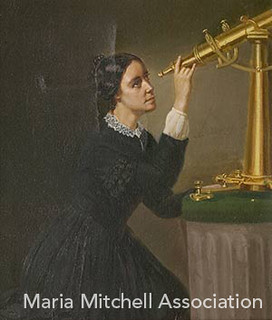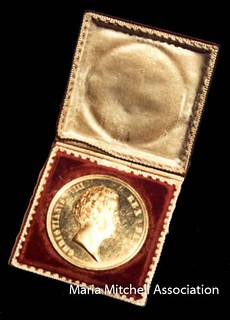
PREV ARTICLE
NEXT ARTICLE
FULL ISSUE
PREV FULL ISSUE
ASTRONOMER MARIA MITCHELL’S GOLD MEDALOn Tuesday August 1, 2017 an episode of National Public Radio's Writer's Almanac referenced an important gold medal in the history of science. -Editor
Maria's early interest in science and the stars came from her father, a dedicated amateur astronomer who shared with all his children what he saw as physical evidence of God in the natural world, although Maria was the only child interested enough to learn the mathematics of astronomy. By age 12, Maria was assisting her father with his astronomical observations and data, and just five years later opened and ran her own school for girls, training them in the sciences and math. In 1838, she became the librarian of the Nantucket Atheneum and began spending her evenings in an observatory her father had built atop the town's bank. On October 1, 1848, a crisp, clear autumn evening, Maria focused her father's telescope on a distant star. The light was faint and blurry, and Maria suddenly realized she was looking not at a star, but a comet; she recorded its coordinates, and when she saw the next night that the fuzzy light had moved, she was sure. Maria shared her discovery with her father, who wrote to the Harvard Observatory, who in turn passed her name on to the king of Denmark, who had pledged a gold medal to the first person to discover a comet so distant that it could only be seen through a telescope. Maria was awarded the medal the following year, and the comet became known as "Miss Mitchell's Comet." To read the complete article, see: The Nantucket Maria Mitchell Association was established in 1902 to preserve the astronomer's legacy. MMA operates two observatories and a natural science museum, and holds her
gold medal. Here's an excerpt from the web site. -Editor
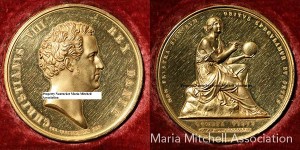 An amateur astronomer himself, Frederick VI, the King of Denmark, decided to offer a gold medal to the first observer to see any new telescopic comet. Frederick VI died in 1839, but his son, Christian VIII, continued to award these medals. Maria was almost denied her medal because William Bond and her father failed to follow the proper procedure for alerting the Danish government of Maria’s discovery. However, more than a year later, the gold medal finally arrived on Nantucket. The discovery of the comet, Comet 1847-VI informally known as “Miss Mitchell’s Comet,” was the event that made Maria famous. She was elected a member of the American Academy of Arts and Sciences, in 1848 as a result. Maria’s father William Mitchell was already a member. The gold medal is today a part of the Maria Mitchell collections. To read the complete article, see: Here's some more information and better photos of the medal, although they are also defaced with MMA watermarks. -Editor
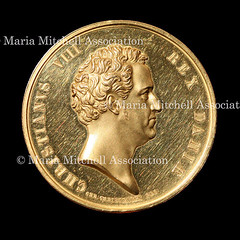 
The prized medal itself is only brought out to the public once a year—August 1st marks the celebration of Maria’s birthday and the Maria Mitchell Association celebrates with a birthday party along lower Vestal Street which this year includes period music, live falconry demonstrations, astronomy activities, and, of course, the annual opportunity to view Maria’s gold medal. To read the complete article, see: There's only one original Maria Mitchell medal, so collectors are out of luck there. But other collecting possibilities are open. How about banknotes issued in 1847 by the
Pacific National Bank? Or this medal from the Hall of Fame of Great Americans? -Editor
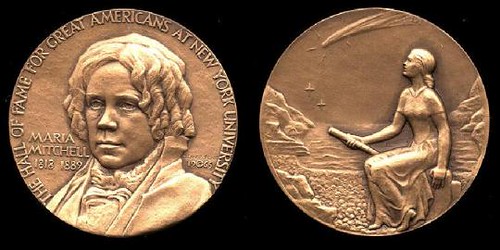 Wayne Homren, Editor The Numismatic Bibliomania Society is a non-profit organization promoting numismatic literature. See our web site at coinbooks.org. To submit items for publication in The E-Sylum, write to the Editor at this address: whomren@gmail.com To subscribe go to: https://my.binhost.com/lists/listinfo/esylum All Rights Reserved. NBS Home Page Contact the NBS webmaster 
|
